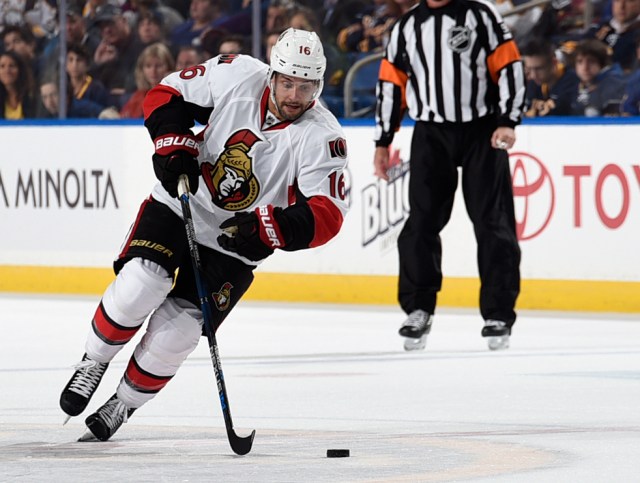
I can’t imagine the emotions running through Clarke MacArthur’s mind at this moment.
After a long and arduous recuperation process that left the Senators’ left winger admittedly feeling like he was symptom-free and physically ready to return to the lineup, he has been shut down for the remainder of the season after doctors refused to medically clear him.
Leading up to this announcement, MacArthur’s return seemed promising.
Not only was he was back skating and practicing with the team, his general manager even guaranteed on a local sports radio interview that MacArthur would return and play games for the organization this season.
All he had to do was pass a three-hour baseline test.
He not only failed to pass its thresholds, but according to TSN‘s Ian Mendes Senators general manager Pierre Dorion “emphasized that several doctors – including those independent from the Senators organization – came to the conclusion that MacArthur should not lace up his skates again this season.”
Considering the class action lawsuits being levied against professional sports leagues and the cognizance of the long-term impacts on athletes who have suffered significant brain trauma, it’s not a surprise to see teams put these interests ahead of their on-ice interests.
The club’s decision has to be a tough pill to swallow for a player who we have to believe now recognizes the importance of transparency and not hiding symptoms after his trials and tribulations last season.
Mendes even addressed rumours that MacArthur had flown down to Florida “desperately seeking another medical opinion”.
If true, it speaks to the levels that MacArthur is willing to go to to have a chance to return to the lineup, but it puts his career at a crossroads.
Even though all indications are that MacArthur wants to continue his career and play, the reality is that he has not played since October of 2015 and regardless of how he feels physically, something is preventing him from meeting the medical standards needed for clearance.
For MacArthur, it’s got to be gut-wrenching to put in all that work and time and still be no further ahead, but as painful as it is, at least the organization and doctors are being diligent and are putting him in a position where his quality of life isn’t being put at further risk.
Now the Senators are tasked with the reality that MacArthur may never play again.
Many have suggested that the Senators may look for another top six forward to replace MacArthur, but it’s difficult to envision the Senators abandoning their dollar-in/dollar-out policy and having the money or willingness to give up the kind of opportunity cost that would required to bring in a quality talent.
Maybe that attitude could shift if ownership and management is convinced that the playoff revenues could help offset the additional salary the Senators take on, but between Ryan Dzingel, Zack Smith and Mike Hoffman, it’s not like the Senators don’t have quality depth on left wing. Similarly, with Bobby Ryan and Mark Stone playing on the first two lines on the right wing, it’s not like the Senators are going to make a move to improve the top-six there either.
Mind you, between this being Dzingel’s first full season and Smith’s uncertain future as an impending unrestricted free agent, maybe the Senators believe they could use some flexibility there.
They also must be considering whether it’s prudent for a small market team to move a surplus of future assets for a perceived upgrade when there are other areas of weakness — the bottom six depth and the blue line — that can be addressed more efficiently given the parameters from which the Senators have to operate.
Ideally, they can find someone who can not only make the team better now, but also be a part of their long-term vision. Where the Senators have hamstrung themselves a bit recently is through their allocation of resources. Trades were made where sizable opportunity costs were used to bring in decent players who have struggled to push the needle and help transition this team from it’s playoff contender status.
The problem is that the congestion in the standings means that the market is limited with quality options now. Rather than exhaust the organization’s prospect depth on what they feel could be a fit now, it may serve the team’s best interests to see what’s available at the conclusion of the season when the market naturally expands. (As an aside, it still remains to be seen whether the Senators could even afford to get in on the markets for desirable players — think Matt Duchene or Gabriel Landeskog. Since MacArthur will now rest on the shelf for the remainder of the year, maybe that frees up some cash, but that isn’t certain either.)
Besides, it’s possible that the best solution for Ottawa’s forward depth could come from within the organization. Once Colin White’s season ends with Boston College, he may be the best source inexpensive two-way depth and it won’t cost the Senators any future assets to get him into the lineup.
Add The Sports Daily to your Google News Feed!